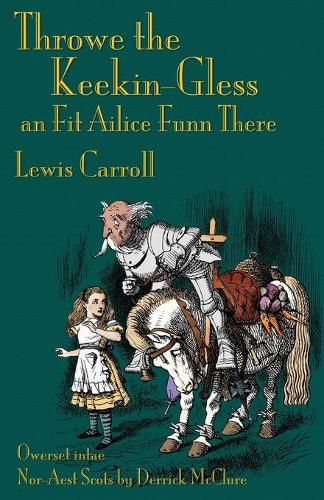Throwe the Keekin-Gless an Fit Ailice Funn There: Through the Looking-Glass in North-East Scots (Doric)
Lewis Carroll

Throwe the Keekin-Gless an Fit Ailice Funn There: Through the Looking-Glass in North-East Scots (Doric)
Lewis Carroll
This title is printed to order. This book may have been self-published. If so, we cannot guarantee the quality of the content. In the main most books will have gone through the editing process however some may not. We therefore suggest that you be aware of this before ordering this book. If in doubt check either the author or publisher’s details as we are unable to accept any returns unless they are faulty. Please contact us if you have any questions.
For a general introduction to the literary and cultural background of the present translation, and to the North-East Scots dialect itself, see the introduction to my translation of Carroll’s previous book, Ailce’s Anters in Ferlielann. As there, I have used a conservative form of the dialect, checking the words and pronunciations against classic literary texts (and this time also against the earlier translation, to ensure consistency). As there too, I have endeavoured to find a specific equivalent for every joke, pun, allusion and other trick of style in the original. The metrical and rhyme patterns of the poems are maintained: as always in poetic translations of any kind, this procedure necessitates some departures from the original wording; and in one instance, namely the sequence of thirteen rhymes on toe in the closing section of the White Knight’s song, I have assumed the licence to treat Carroll’s lines with complete freedom. Puns and other forms of word-play appear at corresponding places to those in the source book: this too necessarily entails departure from the original wording, as in the Midgie’s (Carroll’s Gnat’s) Somethin about a haverin aiver, ye ken to replace Something about ‘horse’ and ‘hoarse’, you know . Culture-bound allusions are replaced with ones more readily associated with the expected new readership (his Anglo-Saxon messengers with their Anglo-Saxon attitudes becoming Pictish messengers with Pictish poseitions); and a clearly-differentiated speech-form, namely the Clydeside basilect, is again used for characters whose dialogue in the original suggests non-standard English (the Frog in Chapter IX and the Wasp in the lost episode). –Derrick McClure
This item is not currently in-stock. It can be ordered online and is expected to ship in 7-14 days
Our stock data is updated periodically, and availability may change throughout the day for in-demand items. Please call the relevant shop for the most current stock information. Prices are subject to change without notice.
Sign in or become a Readings Member to add this title to a wishlist.


